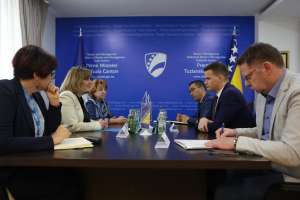SARAJEVO, October 1 (FENA) - Indeed, I think we did achieve a lot in the last three years, but all that would not have been possible without a close and genuine collaboration we have had with responsible ministries, other government bodies at all levels, municipalities, non-governmental organizations, volunteers, but also the ordinary citizens of this beautiful country, said the UNHCR Regional Representative for Southeast Europe and a Representative for BiH, Anne-Christine Eriksson in a farewell interview.
“Just last week I had the honor to plant a linden tree, in the Ambassadors’ Alley, in the Stari grad municipality. I understood this symbolic act not only as a personal acknowledgement, but also as the recognition of the work that my organization UNHCR, the UN Refugee Agency, has done in the last three years, while I have been at its helm in Bosnia and Herzegovina, in helping the most vulnerable people, who were forced to leave their most valued, their homes, in search of safety and a more dignified life
And after my mission here as the head of the UNHCR ends, I am looking forward to return to Bosnia and Herzegovina to witness further progress achieved in the protection of refugees, the internally displaced persons and asylum-seekers – just as the growth of “my” linden tree that I have the pleasure and honor to plant. ,” says Eriksson.
First of all, and in line with our core mandate, UNHCR has been putting much effort, especially in the last two years, to work with the authorities of Bosnia and Herzegovina, at all levels, as well as with the civil society organizations, and with other UN sister agencies in BiH, to address challenges related to the increased arrivals of people, who are originating from other parts of the world, to this country, in search of protection.
In that sense, we have been intensely working with the responsible institutions on the further development of the asylum system here, to be able to adequately receive, accommodate and integrate people who are unable to return to their countries of origin, due to wars raging there, but also due to well-founded fear of persecution and of severe violations of their basic human rights.
Under the current situation of increased arrivals of refugees and migrants, which is without any doubt additionally straining BiH’s fragile asylum system, UNHCR’s role remains focused on working with relevant authorities on ensuring that that the rights of asylum-seekers and refugees are guaranteed and that they have access to basic services, as defined by local laws and in line with international standards. Considering the mixed nature of the influx of people, UNHCR also contributes to the humanitarian response and to the protection of the most vulnerable, including by leading the legal protection part of the UN response.
Also, in the context of actions aimed at closing the chapter the displacement within the Annex VII of the DPA, UNHCR has been, and remains, an important, and proud, partner in the unprecedentedly successful Regional Housing Program, a project of assisting the countries of the region, including Bosnia and Herzegovina, to create for the neediest among the displaced by the armed conflicts of the 1990s in the region a genuine opportunity to rebuild their lives in more humane, sustainable conditions. Just a month ago, in Mostar, we marked the delivery of the 1000th housing unit to a beneficiary of the Regional Housing Program. In that segment, UNHCR has continuously, in close cooperation with our colleagues at the OSCE, helped the responsible authorities of BiH to select the neediest among that population of the returnees, the internally displaced and refugees to get the assistance that they deserve.
For us, as the UN Refugee Agency, says Eriksson, it is crucial that all those who want to seek international protection, i.e. asylum, in BiH, can do so without any hindrance. The right to seek asylum is a fundamental human right, and it is also enshrined in the national legislation. We have been working with the colleagues at the BiH Ministry of Security to make it easier for the people who may be in need of international protection to lodge their asylum claims in BiH.
Based on the interviews we have conducted with people awaiting asylum interviews or first-instance decision on their claim, or registration of their asylum claims, we are convinced that some of them, and in fact an increasing number of families, indeed have the genuine intention to stay in BiH, rebuild the lives of their families here and contribute to local communities.
This is contrary to the “conventional wisdom” that all asylum-seekers in BiH are single males who are misusing the asylum system to move on, towards the wealthier EU countries. Too often, the procedure of formal registration of asylum claims is burdened with various administrative requirements, which are making the process of registering asylum requests, and the decision if they are justified or not, unnecessarily complicated and lengthy.
We will continue to provide support to our colleagues at the MoS Asylum Sector to respond to an increased number of asylum applications. However, we believe that more can and must be done today, so that all those, and especially the most vulnerable among them, wishing to seek asylum in BiH can lodge their requests without impediment, and in a simple, timely manner. Also, it is essential and necessary, to improve and expedite the process of determining if they would deserve a protection status in BiH, or not.
We are also concerned that all asylum-seeker children can enroll in schools throughout BiH, without delay and under the conditions as for BiH nationals. Unfortunately, today, this is still not the case, even though this right, the right to education, is guaranteed in the national asylum legislation.
Strengthening of integration-related service for persons under international protection and asylum-seekers, such as language classes and vocational training, and facilitated access to employment and housing are necessary. To that end, UNHCR encourages local and international organizations and institutions to introduce relevant projects to support the effective and holistic integration of persons under international protection, as well as asylum-seekers in BiH. An effective integration is a vital component of a functioning asylum system. At the end of the day, Bosnia and Herzegovina, and other countries of South East Europe, should be able to receive, accommodate and integrate people in need of international protection, and not just remain the “region of transit” for most of them moving onward to the EU.
With regard to the returnees and the internally displaced by the regional conflicts of the 1990s, there are still categories and sub-groups of this population who stand the risk of not being assisted adequately and sustainably, within the Annex VII DPA. It remains UNHCR’s priority to engage the responsible institutions, most notably the BiH Ministry for Human Rights and Refugees, to create all necessary conditions for addressing the remaining needs of these people. At the same time, we continue to advocate with international donors to secure necessary resources for a successful closure of the Annex VII.
Since June 2018, UNHCR in Bosnia and Herzegovina received 1.625.000 euros from the EU funds. In addition, generous donations by the United States and Switzerland have enabled UNHCR to concretely and effectively assist Bosnia and Herzegovina in addressing the challenges of the migrant-refugee situation and to ensure that the persons we care for receive all the necessary help.
These donations are exclusively used to support Bosnia and Herzegovina's response to the ongoing migrant-refugee situation - primarily for direct assistance to asylum-seekers and refugees. Specifically, in 2018, UNHCR was covering the cost of their primary and secondary health care. Also, these means were used to finance emergency, temporary accommodation for the most vulnerable categories, such as families with children and unaccompanied minors, while they were waiting to be accommodated in adequate reception centers or institutions.
With the help of our partners, UNHCR secures services of translation, provision of information, free legal aid and psychosocial support to asylum-seekers in and outside reception centers. Two vans were purchased for the needs of the staff of the Ministry of Security to improve the mobility of the team registering asylum applications. Since 2018, UNHCR has been funding a number of ongoing activities, most notably strengthening of the human and technical capacity of the Asylum Sector at the Ministry of Security, to ultimately optimize all segments of the asylum application process. In BiH, UNHCR also covers the costs of the staff of the Ministries of Security and of Human Rights and Refugees working at the Delijaš and Salakovac reception centers. Mobile teams are providing necessary protection and are referring asylum-seekers to bodies and services that can provide them with the assistance they need. This all is done for the benefit of asylum-seekers, but also for the communities hosting them. UNHCR staff also collects data from the field, processes it and shares it with all partners.
A year after the historic adoption of the Global Compact on Refugees, UNHCR is organizing the Global Refugee Forum, to take place at our headquarters in Geneva in December 2019.
The GRF will bring together government leaders from around the world, alongside business, international organizations, experts, civil society, and refugees to showcase and review progress against the objectives of the Global Compact on Refugees and to pledge further collective action in responding to refugee situations. These pledges can include more financial, material and technical support to host countries; additional resettlement places, humanitarian visas and education opportunities for refugees; but also changes to national laws and policies that enable refugees to become more self-reliant and better included in local societies and economies.
World leaders will come together to show what they are already doing – individually or collectively – to enhance refugee resilience and self-reliance, and illustrate the tangible ways that host communities are being supported. Moreover, the Global Refugee Forum is an opportunity to catalyze innovative partnerships across sectors and for all relevant actors – to make a real difference in the lives of refugees and of their host communities.
This calls for vision and ambition. We hope that the governments, including Bosnia and Herzegovina, will use the opportunity of the Forum to be both bold and concrete in their commitments to improve the lives of refugees and their hosts.
Speaking about what UNHCR is doing to find solutions to the phenomenon of a record number of displaced people worldwide, Eriksson said that one year after the historic adoption of the Global Compact on Refugees, UNHCR is organizing a Global Refugee Forum (GFR) to be held in Geneva in December 2019.
The GRF will bring together government leaders from around the world, alongside business, international organizations, experts, civil society, and refugees to showcase and review progress against the objectives of the Global Compact on Refugees and to pledge further collective action in responding to refugee situations. These pledges can include more financial, material and technical support to host countries; additional resettlement places, humanitarian visas and education opportunities for refugees; but also changes to national laws and policies that enable refugees to become more self-reliant and better included in local societies and economies.
World leaders will come together to show what they are already doing – individually or collectively – to enhance refugee resilience and self-reliance, and illustrate the tangible ways that host communities are being supported. Moreover, the Global Refugee Forum is an opportunity to catalyze innovative partnerships across sectors and for all relevant actors – to make a real difference in the lives of refugees and of their host communities.
This calls for vision and ambition. We hope that the governments, including Bosnia and Herzegovina, will use the opportunity of the Forum to be both bold and concrete in their commitments to improve the lives of refugees and their hosts, underlined Eriksson in her farewell interview.
(FENA) S. R.










